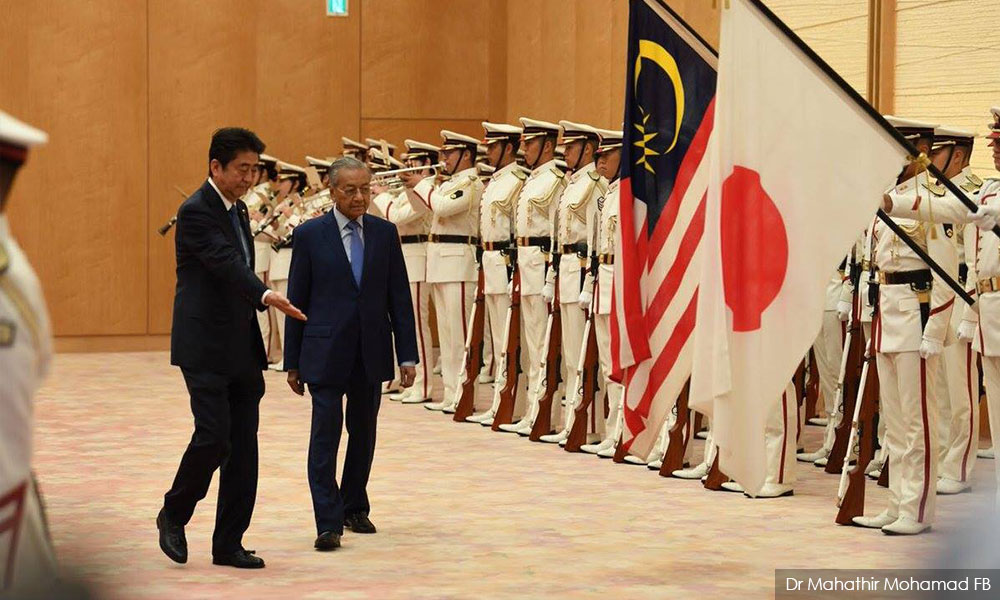Japan is renowned as a developed nation spearheading the development of technology in various fields, among which are manufacturing, information technology and computers.
“The land of the rising sun” is a phrase synonymous with the country whose citizens value discipline, mutual respect and hard work.
Despite having achieved the status of a developed nation, Japan is still working to overcome its weaknesses to stay abreast of current developments.
Accompanying Prime Minister Dr Mahathir Mohamad on his recent working visit to Japan, this writer had an opportunity to witness for himself, how the country has imbibed the culture of continuous or lifelong learning among its people, so as to not be left behind in terms of the current, mainstream development.
Among the things that caught my eye was the determination of the Japanese people to enhance their command of English, despite the country admittedly, being a superpower in the field of science and technology.
As such, this issue was one of those which grabbed the attention of the prime minister, who said even a developed nation like Japan had acknowledged the importance of mastering English in line with current needs.
“Although Japan has long been associated with science and technology, it still finds English a necessity.
“The country admits that to learn new things related to science, it needs to master the English language,” he told reporters during his visit.
Ironically, Malaysia had introduced the learning of science and mathematics in English, when Mahathir was previously also the prime minister.
Mahathir emphasised that mastering the English language was the best way for Malaysia to remain competitive, particularly in the field of science and mathematics, due to the speedy evolution of both.
“Science and mathematics are constantly evolving due to the research being undertaken, and with the result that we are now discovering things previously unknown, and being put to use such as microelectric, microchips and digitalisation, alongside other new introductions,” he added.
He said although Bahasa Melayu could be used in science and mathematics, it was nevertheless very limited, due to the lack of manpower in terms of having competent translators to translate research papers into the language.
“If we do not use English and opt for Bahasa Melayu, we need those who understand English to translate into Bahasa Melayu. But, such people are not many, while daily there are much new research efforts.
“If we want to be ‘up-to-date’ and not be left behind, we must chase this knowledge. But, we are unlikely to find that number of people who can translate (this amount of research) for use by a great many students,” Mahathir said.

During his visit to Japan, he also dropped by the offices of two Japanese companies with operations in Malaysia, namely Towa Corporation and Shimadzu Corporation.
He received a briefing on the capabilities and operations from the top management of both companies.
Mahathir who arrived on Thursday also took time to visit the Ritsumeikan Elementary School and witnessed first hand, its uniqueness in embracing both the traditional methods and modern technology, towards learning.
He also expressed his desire to apply the technology used by Ritsumeikan in Malaysian schools and in line with the government's plan to introduce new learning methods using recorded lessons to facilitate and improve the quality of education.
Ending his visit on Saturday, Mahathir attended a dinner with about 200 Malaysian students and expatriates from Osaka and Kyoto.
During his meeting with the media before ending the visit, Mahathir described his visit this time as providing many lessons, although he had previously visited Japan on almost 100 occasions, including official visits.
This clearly showed that as the formulator of the Look East Policy, he felt there are still many things that Malaysia can learn from Japan, despite the policy having been introduced in 1982.
If Malaysia cannot compete with Japan’s advances in terms of the economy, science and technology at present, it may be that Malaysians can look to emulating the efforts of its people in consistently striving to improve themselves.
Hopefully, one day, Malaysia can then stand equally tall, alongside this global economic power.
- Bernama

